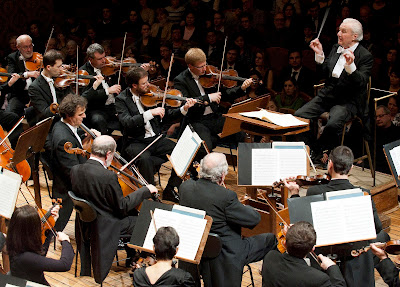Rudolfinum
February 24
 |
| Davis conducted from a chair for much of the evening. |
“Here comes the Titanic.”
Chatting during intermission Friday night, the Czech Philharmonic player could have been talking about the opening piece of the second half, Sibelius’ The Oceanides, which builds to a roaring crash of great waves. Instead, he was referring to the conductor, Sir Colin Davis, who posed a ticklish problem for the orchestra last week.
From the very first rehearsal, it was clear that Davis was not up to his usual standards. In fact, his gaffes were so pronounced that both the musicians and orchestra managers were concerned about what the performances would sound like. After meetings, management decided to cancel the live radio broadcast of the Thursday concert. Instead, Radio Vltava played a recording of Davis conducting the same program with the London Symphony Orchestra.
And out of respect for the 84-year old Davis, who has a list of conducting and recording credentials longer than your arm, the musicians decided not to complain. Instead, they talked among themselves about how to play the music, more or less as Davis was conducting it, but with their own attention to detail and quality.
 |
| Reprising a familiar program. |
Which explains why the two pieces in the first half of Friday’s concert sounded exactly the same. There was not a bit of difference in intonation, interpretation or sound quality between Haydn’s Symphony No. 96 (“The Miracle”) and Dvořák’s Symphonic Variations Op. 78. Both had the elegant, formal gloss that characterizes Davis’ work, with everything from Haydn’s fanfares to Dvořák’s galloping rhythms rendered in the same glowing pastels – pleasant, but otherwise unremarkable. While each piece had its moments, a casual listener could have been forgiven for leaving the hall during the first, returning during the second, and thinking it was the same work.
The two Sibelius selections in the second half were better, principally because of the pieces themselves, complex and challenging works that broke new ground early in the 20th century. The Oceanides built nicely, with rich textural elements, though it dropped off rather abruptly after the cacophonous climax of surging waves. The composer’s Symphony No. 7, his final work, felt a bit bloated, meandering through the opening Adagio before developing some bite. Davis knows the piece well, which added to the disappointment of hearing it sound like a traditional symphony rather than an electric, inventively layered work.
In the end, that was true of both Sibelius pieces – fascinating to hear, but one-dimensional in sound, lacking any of the careful nuances and facile turns of tempo that bring them to life.
The Thursday performance was reportedly better than Friday’s. In fact, it might well have gone out over the airwaves without embarrassment to anyone. Still, once a broadcast is aired, there is no recalling it – nor the potential damage to an orchestra’s (or conductor’s) reputation. So the Czech Philharmonic managers and players deserve a lot of credit for handling a delicate situation with class, and coming out of the week with two estimable concerts.
The Friday performance also held a noteworthy moment for this critic, who over the course of years in the concert halls has developed a theory: An audience’s musical intelligence is inversely proportional to its display of enthusiasm (e.g., applauding between movements). This was confirmed once again by the gentleman in the seat directly in front, who spent the entire concert talking to his companion, then was one of the first to leap to his feat to give Davis a standing ovation. Though the realization was clearly beyond his ken, that was something to be embarrassed about.
For more on Sir Colin Davis: http://www.cami.com/?webid=2046
Photos courtesy of the Czech Philharmonic







